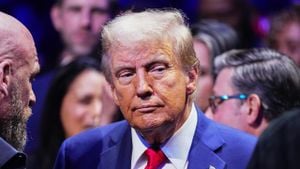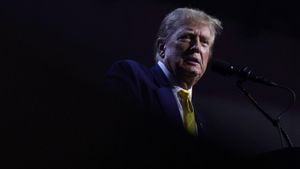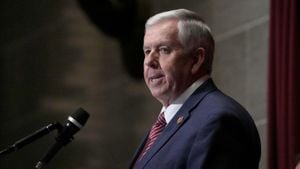Elon Musk has long been a controversial figure, but his hosting stint on Saturday Night Live (SNL) back in May 2021 sparked renewed debate when recent claims of unprofessional behavior resurfaced. This controversy kicked off once again when SNL star Chloe Fineman revealed on TikTok how Musk had allegedly made her burst out crying during their time working together on the show. Following Musk's criticisms of SNL and its cast, Fineman felt compelled to confess her emotional story about the Tesla CEO’s tough feedback.
Fineman's TikTok, which she later removed, came shortly after Musk took to social media to critique the show, particularly targeting Dana Carvey's impersonation of him during a recent episode. "I just saw some news article about Elon Musk being like butt-hurt about SNL and his impression, but I'm like, you're clearly watching the show. Like, what are you talking about?" Fineman expressed frustration over Musk's comments, explaining, "I'm gonna come out and say at long last, I'm the cast member he made cry. And he's the host who made someone cry." She recalled the harsh critique Musk delivered after reviewing her script prior to the live show.
Fineman revealed, "You stared at me like you were firing me from Tesla and were like, ‘It’s not funny.' Then you started pawing through my script, flipping each page, being like, ‘I didn’t laugh once, not one time.’” Despite this cold reception, she noted the skit did air and she eventually enjoyed the experience, stating, "I actually had a really good time and thought you were really funny during the show."
Initially, when Musk hosted SNL, there was already speculation about his attitude on set. A few days prior to Fineman’s announcement, Bowen Yang had teased about unnamed hosts making cast members cry. Yang mentioned on Watch What Happens Live with Andy Cohen, "This man... made multiple cast members cry on Wednesday before the table read because he hated the ideas." Speculation mounted as fans tried to connect the dots. Following Fineman's reveal, many began to suspect Musk was the host Yang referenced.
The crossover between Musk’s technological influence and his celebrity status intensified public interest, especially since he is known for being outspoken on various topics, including his political views and media representations. Fineman's initial excitement over working with Musk was palpable, and her disappointment was equally stark when confronted with his brutal honesty. The backlash against Musk was compounded by his post-show critiques where he implied SNL had become less relevant over the years.
After Fineman's revelations went public, Musk responded on X, stating, "Frankly, it was only on the Thursday before the Saturday [the show aired] when ANY of the sketches generated laughs. I was worried... My SNL appearance is going to be so f—king unfunny, it will make a crackhead sober! But then it worked out." His flippant tone and casual dismissal of Fineman’s hard work drew ire from fans and fellow cast members alike.
Casting directors and fellow actors weren't shy about sharing their criticisms of Musk either. Following his hosting stint, some even labeled his performance one of the worst SNL episodes to date. Critics from outlets like The Guardian and NPR didn't hold back, labeling his comedic debut as awkward and suggests his role was merely to boost his public image without adding substance to the show's legacy. One review noted it would "go down as one of SNL’s worst episodes ever,” highlighting the now-infamous perception of Musk as unfunny.
The general atmosphere following Musk's appearance on SNL was charged. According to Fineman, the cast had mixed feelings leading up to the show, fearing Musk's critique would extend beyond her script to other members' contributions. This fear wasn't unfounded, as the SNL atmosphere is famously collaborative, allowing for creative differences to spark intense discussions. Fineman's experience seemed to echo Yang's before the show's live performances, reflecting broader tensions surrounding the 2021 episode.
SNL's recent portrayals of current events and political figures have incorporated layers of humor pertinent to contemporary audiences. Musk himself waded back and forth, implicatively criticizing SNL for its perceived shortcomings. Yet such public critiques of past colleagues reveal not just his ego but possibly insecurities tied to the more significant controversies surrounding his tech ventures and affiliations.
During his X comments, Musk asserted, “SNL has become so woke” showcasing his mood on the shifting political climates where SNL often satirizes the events feeding off the headlines. This claim ties back to his earlier statements about the show’s content being "increasingly out of touch with reality." This reflects his distinctive view of media and how it frames prominent individuals like him.
This emotional outburst has led to various discussions within the entertainment industry, inviting questions about mental health and the treatment of creatives. Musk’s story has reignited dialogue on how major personalities, particularly those with significant influence, manage tough feedback and the balance of radical honesty with courtesy. Being at the helm of celebrated tech companies does not prepare one for the emotionally complex landscapes of live performance.
And for the cast of SNL, experiences like Fineman's—however uncomfortable—are crucibles through which they navigate the wild dynamics of humor on live television. The question looms: Is Elon Musk's brutally candid style the way forward, or does it reflect a growing societal discomfort with vulnerability?
While many fans may struggle to reconcile the bust-up of creativity with harsh criticism, it's imperative to recognize conversations following such incidents can generate needed discourse about the emotional toll on performers and the measures they take to create during times of great scrutiny. This episode speaks not only to current tensions facing comedians and influencers alike but challenges the notion of healthy creative processes amid celebrity interactions.
These recent revelations may change the way stars and audiences see interactions on stage and the pressure of post-performance discussion, prompting professionals to ask how they weigh their duties to humor against personal backlash. Can one transform hurtful criticisms from colleagues, especially those breaking societal barriers like Musk within humor, for healthier outcomes? Or will harsh truths linger long after the curtain falls?
Fineman's story provides insight not just to her experience with Musk, but highlights the palpable tensions behind the scenes of one of comedy's longest-running institutions. The fallout from this public scrutiny transcends individual interactions; it encapsulates larger conversations about communication, mental health, and creative integrity within the fast-paced world of celebrity and media.
Engaging with this narrative sheds new light on the intersection of comedy and emotion, leaving audiences to ponder what it truly means to ‘make it’ as these personalities navigate their careers within the specter of both success and vulnerability.



